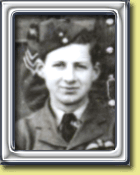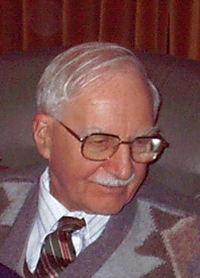
SGT 964956
Lawrence Hugh Houghton
Sgt Lawrence Hugh Houghton (Hugh) had been flying T2905 on the night of the crash and was rescued from the plane by Martin Bools, who carried him, assisted by David Best to his parents house (18 Maurice Road). He sustained a fracture to his left shin and scarring to his knees and forehead. He remembers being visited in hospital by a nurse who lived near the park (possibly Mrs Voice who lived on Effingham Road and who had helped treat Sgt Jones before he was taken to Bristol Royal Infirmary) and by a local Methodist minister. Click here* listen to Hugh's memories of the crash.
He had joined the RAF wanting to be a pilot but was not allowed to become one initially and began his service as a navigator, only later becoming a pilot.
 After recovering from the crash he returned to flying Wellington's and remembers flying several more times with Dickie Wish until Dickie had to give up flying because of severe headaches. On his 14th flight whilst on a bombing raid at Lübeck his plane ran out of fuel. He flew on to Holland, but was captured by the Germans and spent the rest of the war as a prisoner of war in Stalag 8b (near to modern day Łambinowice in Poland). This was Wellington Z1203 (a MK IV) from 142 Squadron stationed at RAF Grimsby. It crashed at 03.46am on 29th March 1942. All six crew were taken prisoner. Hugh's complete memoirs can be found at the Imperial War Museum. He has 3 children and several grandchildren. Above is a photo of Hugh taken in 2002. I have spoken to Hugh several times over the years since first making contact with him in 2001. In 2012 he celebrated his 92nd birthday.
After recovering from the crash he returned to flying Wellington's and remembers flying several more times with Dickie Wish until Dickie had to give up flying because of severe headaches. On his 14th flight whilst on a bombing raid at Lübeck his plane ran out of fuel. He flew on to Holland, but was captured by the Germans and spent the rest of the war as a prisoner of war in Stalag 8b (near to modern day Łambinowice in Poland). This was Wellington Z1203 (a MK IV) from 142 Squadron stationed at RAF Grimsby. It crashed at 03.46am on 29th March 1942. All six crew were taken prisoner. Hugh's complete memoirs can be found at the Imperial War Museum. He has 3 children and several grandchildren. Above is a photo of Hugh taken in 2002. I have spoken to Hugh several times over the years since first making contact with him in 2001. In 2012 he celebrated his 92nd birthday.
During the dedication ceremony to unveil the memorial (see my Memorials Page) to the crash in St Andrews Park I was very privilaged to read an address on behalf of Hugh. It read as follows:-
First of all I would like to thank you for affording me the honour of giving this Commemoration Address honouring the memory of the three young airmen who were so tragically killed on that fateful night in April 1941, when the Wellington bomber I was piloting crash landed in St Andrew's Park. Now the time has come to remember these three fine young men and in some way to do justice to their memory. Please accept my sincere apologies for my absence from your Commemoration Service. My health has not been too good after the damage done by last years very cold winter and at 89 I am not up to travelling any more.
I would like to begin this by expressing my unbounded admiration for the heroic efforts made by the citizens of St Andrew's Park to rescue us from the burning plane. They were incredibly brave. My own life was saved by a man named Martin Bools who heroically hauled my unconscious body out of the cockpit and put it in a place of safety. I must also give much praise to John Clarke who went to immense trouble to get all the facts relating to this event and in tracing most of the people involved. I am sure that his grandfather, Charles Clarke, would be very proud of him and I am certain in my own mind still is. I am glad that John's strong desire to see a permanent memorial has eventually been realised.
As I remarked in my brief statement on BBC Radio Bristol in March 2009, we were all still training to learn our jobs and because of that very fact we never got to know our colleagues. We were all strangers and that was the case on this occasion. I had met Pilot Officer Evans, my co-pilot, on about two previous occasions and that was all. The rest of the crew were strangers to me. We were all in Advanced Training School and knew how to perform our relative tasks efficiently. We were learning how to work together as a crew and that was very important and took some time to master.
Since I did not know these fine young men personally I am at somewhat of a loss as to how to do proper justice to their memory. This crash has been a source of great sadness all my life and will continue to be so. As the pilot in charge of the aircraft I offer to the loved ones and friends of the three fine young men who perished and of those who were injured on that dreadful April night in 1941 my unqualified apology for having caused them this deep grief and trust that totally inadequate as such an expression must be it may do its part in the healing process.
I wish you all God bless.
Hugh Houghton